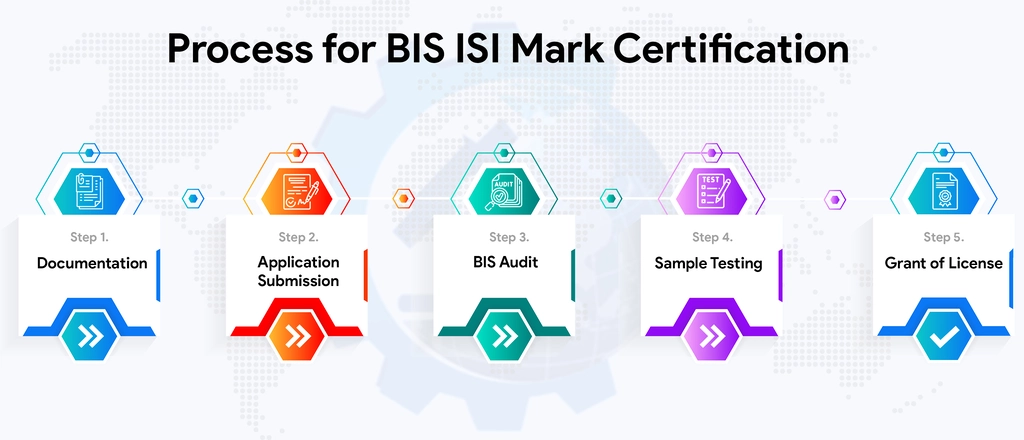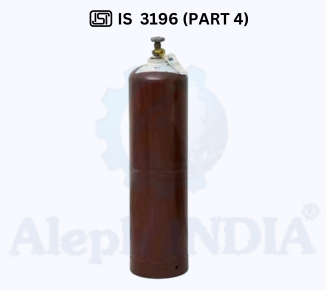BIS CERTIFICATION FOR WELDED LOW CARBON STEEL CYLINDERS IS 3196 (PART 4)
Published Date: January 14, 2025 4 min Read
BIS certification is mandatory for Welded Low Carbon Steel Cylinders Exceeding 5 Litre Water Capacity for Low Pressure Liquefiable Gases, Part 4: Cylinders for Toxic and Corrosive Gases (Amalgamation of IS 7680,7681 and 7682), governed by the standards outlined in IS 3196 (Part 4). This standard ensures that the cylinders meet stringent safety, design, and performance requirements, providing secure and efficient storage and transport solutions for LPG. As essential components in LPG supply chains, these cylinders must comply with rigorous criteria to ensure safe handling and durability. Compliance with IS 3196 (Part 4) signifies a manufacturer’s dedication to delivering high-quality, safe, and reliable LPG cylinders.
IS 3196 (Part 4) – Welded Low Carbon Steel Cylinders for LPG
The standard IS 3196 (Part 4) specifies detailed requirements for the design, materials, construction, and testing of welded low carbon steel cylinders intended for LPG use. It ensures that these cylinders can withstand high-pressure conditions, mechanical stress, and environmental factors. The guidelines include specifications for cylinder material, welding quality, pressure relief devices, valve fittings, and testing protocols such as hydraulic, burst pressure, and leakage testing. Adhering to IS 3196 (Part 4) guarantees that the cylinders meet the highest safety and operational benchmarks, ensuring optimal performance and reliability.
Benefits of BIS Certification for LPG Cylinders
Mandatory BIS certification under IS 3196 (Part 4) ensures compliance with national safety and performance standards for welded low carbon steel cylinders. For consumers, it provides confidence in the safety and reliability of the product. For manufacturers, BIS certification enhances market credibility, ensures adherence to regulations, and fosters consumer trust. Certified cylinders not only meet essential safety standards but also highlight the manufacturer’s commitment to producing durable and efficient LPG storage solutions.
Key highlights
| Product Name | Welded Low Carbon Steel Cylinders Exceeding 5 Litre Water Capacity for Low Pressure Liquefiable Gases, Part 4: Cylinders for Toxic and Corrosive Gases (Amalgamation of IS 7680,7681 and 7682) |
| Applicable Indian Standard | IS 3196 (Part 4) |
| Applicable Certification Scheme | Product Certification Scheme (ISI Mark Scheme) Scheme 1 - Schedule 2 |
| Compliance Requirement | Mandatory |
| Quality Control Order | Click here | Scope as per Standard | The standard IS 3196 (Part 4) pertains to welded low carbon steel cylinders designed for the storage and transportation of toxic and/or corrosive low-pressure liquefiable gases, with a nominal capacity of up to 250 liters of water. It outlines comprehensive requirements for the design, materials, manufacturing process, construction, testing, and marking of these cylinders to ensure safety, reliability, and compliance with industry standards. |

Note
For Detailed Information about the Procedure for BIS ISI Certification, Visit :
Timeline for BIS Certification
The estimated timeline for obtaining BIS certification under IS 14899 is as follows:
- For Indian Manufacturers (Standard Timeframe – 30 days)
- For Foreign Manufacturers (Standard Timeframe – 180 days)
Conclusion
BIS certification under IS 3196 (Part 4) establishes a critical benchmark for the safety and reliability of welded low carbon steel cylinders for LPG. Manufacturers complying with this standard demonstrate their dedication to quality and safety, ensuring their products meet stringent requirements for secure and efficient operation.
Collaborate with Aleph INDIA for expert guidance in obtaining BIS certification and position your products as trusted, high-quality solutions in the LPG industry.
Frequently Asked Questions
International Audits & Participation
Testimonials
BIS REGISTRATION FOR ELECTRONIC & IT PRODUCT
In the era of globalization, world trade is growing rapidly and henceforth, Manufacturing and Import/Export businesses are also growing drastically...View More
BIS CERTIFICATE FOR FOREIGN MANUFACTURER
The Economy of India-the fastest developing economy on the globe with the capabilities that help it matches up with the biggest international...View More
PRODUCT CERTIFICATION SCHEME (ISI MARK) FOR DOMESTIC MANUFACTURERS
Anything a person buys from food to cars, clothes to electronics, branded to unnamed products there is always a question that wanders in one’s...View More
WIRELESS PLANNING AND COORDINATION (WPC)
WPC: Wireless means communication done from one point to another point without the wires and cables. Electromagnetic waves carry the ...View More
BUREAU OF ENERGY EFFICIENCY (BEE) CERTIFICATE
BEE CERTIFICATE: Energy is the future, and its conservation is the way of the bright future. Everyone claims the environment is important...View More
E-WASTE MANAGEMENT
E-waste is one of the world's fastest-growing trash streams. We currently manufacture almost 50 million tones of it each year...View More
View All Services
Request a call back.
Would you like to speak to one of our Senior Technical advisers over the phone? Just submit your details and we’ll be in touch shortly. You can also email us if you would prefer.






























